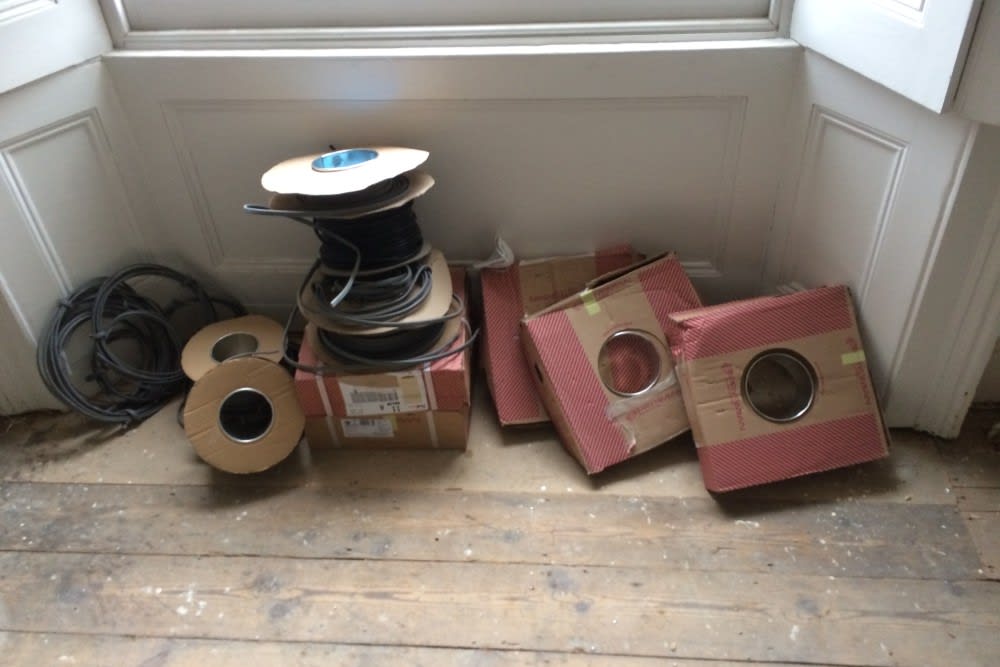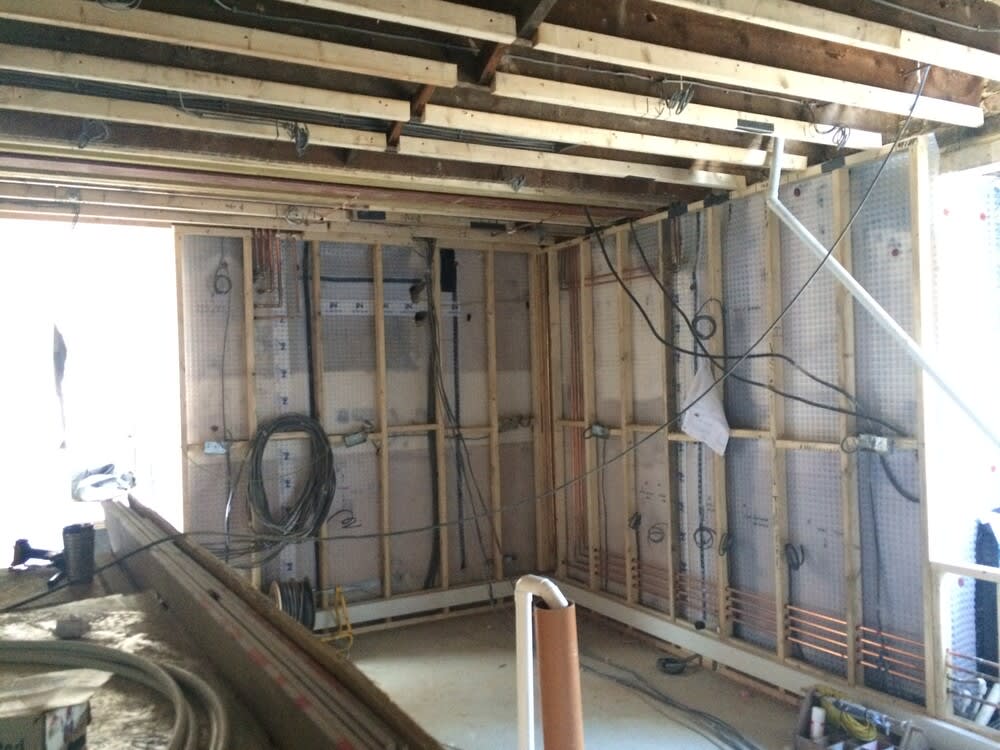
posted 1st October 2025

How Much Does a House Rewire Cost?
Wondering how much a house rewire costs in 2025? On average, rewiring a 2-bed home costs £1,500–£2,000, while a 3-bed is £2,000–£2,500.
At Chase Farm Electrical, our NICEIC Approved electricians provide full rewires with BS 7671 certification.
Rewiring a house can be a big project, but it’s one that can make your home safer, more efficient, and even more valuable.
Whether you’re upgrading an older property, adding modern features, or just making your home safer, knowing the costs involved can help you plan better. In this guide, we’ll walk you through what to expect, where you can save, and why rewiring is a smart investment.
Why You Might Need a House Rewire
- Old or outdated wiring that no longer meets safety standards.
- Frequent tripping of circuit breakers or blown fuses.
- Flickering or dimming lights, especially when using multiple appliances.
- Overheating sockets or a burning smell near outlets.
- Lack of earthing or old-fashioned two-prong outlets.
Understanding the House Rewiring Process
Rewiring your home isn’t just about replacing old cables – it’s a chance to bring your electrical system up to modern standards. Here’s what you can expect:
Initial Assessment
An electrician will inspect your home to figure out the scope of work needed. This assessment includes checking for outdated wiring, faulty sockets, and potential safety hazards.
Planning and Design
Creating a wiring plan that meets current safety standards and supports your electrical needs. This includes mapping out new circuits, calculating electrical loads, and deciding on the placement of sockets and switches.
Installation of New Wiring
Running new cables, installing modern outlets, and upgrading the main panel if necessary. This phase also includes fitting new circuit breakers and RCDs for enhanced safety.
Final Testing and Certification
Making sure everything is up to code with a detailed electrical installation condition report (EICR). This final step ensures your home is safe and fully compliant with current regulations.
Factors That Influence the Cost of a House Rewire
1. Size of the Property
Bigger homes need more wiring, outlets, and labour, which means higher costs.
2. Number of Rooms and Circuits
More rooms mean more circuits, sockets, and potentially higher labour costs.
3. Accessibility of the Wiring
Older homes with plaster walls or tight crawl spaces can be more challenging and costly to rewire.
4. Type of Wiring Used
High-quality, modern wiring is more expensive but offers better safety and efficiency. Using industry-leading brands like Prysmian cable can improve the reliability and safety of your electrical system, reducing the risk of faults and extending the lifespan of your wiring.
5. Electrical Upgrades and Add-Ons
Adding smart home features, extra sockets, or upgraded fuse boxes can increase costs but add significant value.
Importance of NICEIC Registration and Building Control Notification
If you’re hiring an electrician in Southampton, Winchester, or anywhere in Hampshire, it’s essential to choose a NICEIC registered contractor. This certification ensures your electrician is qualified to work safely and legally, providing you with peace of mind. NICEIC-approved contractors follow strict guidelines, ensuring their work meets the latest safety standards. Additionally, they handle all required Building Control Notifications, ensuring your rewire is fully compliant with local regulations.
Why Choose Chase Farm Electrical Ltd?
Chase Farm Electrical Ltd has built a strong reputation for providing reliable, high-quality electrical services throughout Southampton, Winchester, and Hampshire. With over 15 years of experience and a commitment to customer satisfaction, they are the go-to choice for homeowners looking for professional rewiring services.
Here’s what some of their satisfied customers have said:
“Very happy with the work carried out for me in my new home, needed lots doing but Nathan was more than happy to help. Such a nice guy, and an expert in his field!” – Google Review
“Chase farm electrical have done work on my behalf on several occasions now.
Always does a professional job, I shall definitely be using again! Highly recommended.” – Google Review
“We have used Nathan and Chase Farm Electrical for a number of years now and would have no hesitation in recommending them. Their efficiency and professionalism is a breath of fresh air when it comes to dealing with contractors and tradesman.” – Google Review
“Chase farm electrical have done work on my behalf on several occasions now.
Always does a professional job, I shall definitely be using again! Highly recommended.” – Google Review
“The team at Chase Farm Electrical were fantastic. They provided clear communication, arrived on time, and did a thorough, high-quality job. Five stars!” – Google Review
Choosing Chase Farm Electrical means choosing peace of mind, quality workmanship, and a team that truly cares about customer satisfaction. They handle every aspect of the job, from initial assessment to final certification, ensuring every project is completed to the highest standards.
Chase Farm Electrical Ltd has built a strong reputation for providing reliable, high-quality electrical services throughout Southampton, Winchester, and Hampshire. With over 15 years of experience and a commitment to customer satisfaction, they are the go-to choice for homeowners looking for professional rewiring services.
How Much Does it Cost to Rewire Different House Sizes?
The price depends mainly on property size and the scope of work. Here’s a quick guide to typical costs in the UK:
| Property Size | Typical Cost (2025) | ||
|---|---|---|---|
| 2-bed house | £1,500-£2,000 | ||
| 3-bed house | £2,000-£2,500 | ||
| 4-bed house | £2,500-£3,500 | ||
| 5 Bed house + | £3,500 + |
At Chase Farm Electrical, our NICEIC Approved electricians complete full house rewires with BS 7671 certification, and issue certificates within 24 hours of completion.
Rewiring a 2-Bed House
Rewiring a 2-bed house typically costs between £1,500 and £2,000, depending on factors like accessibility, the type of wiring used, and whether additional features like smart home integration are included. Using high-quality materials like Prysmian cable can improve safety and reduce long-term maintenance costs.
Rewiring a 3-Bed House
Rewiring a 3-bed house generally costs between £2,000 and £2,500. This cost covers everything from removing old wiring to installing new circuits, outlets, and fittings. It also includes necessary safety tests and certifications to ensure your home is fully compliant.
Rewiring a 4-Bed House
Rewiring a 4-bed house can range from £2,500 to £3,500, depending on the size and layout of the property. Larger homes often have more circuits and require more extensive work, including upgrading the main electrical panel and integrating smart home features if desired.
Rewiring a 5-Bed House
Rewiring a 5-bed house can range from £3,500 to £4,000, depending on the complexity of the job, the quality of materials, and the number of circuits required. This price includes labor, testing, and certification.
These prices include labour, materials like Prysmian cable, and testing. However, costs can increase if your property has hard-to-reach wiring or requires significant structural adjustments.
Hidden Costs to Consider
1. Wall and Ceiling Repairs: Rewiring often involves cutting into walls and ceilings.
2. Permits and Inspections: Most electrical work requires permits and professional inspections.
3. Upgrading Electrical Panels: Older homes may need new panels to handle increased electrical loads.
4. Temporary Accommodation: Larger projects may require you to move out temporarily.
5. Disposal of Old Wiring: Some contractors charge for removing and disposing of old wiring.
6. Electrical Testing and Certification: Additional costs may apply for final safety checks and certificates.
7. Replastering and Decorating: You may need to repaint or repair walls after a rewire.
8. Electrical Design and Planning: Custom wiring plans can add to the cost.
9. Asbestos Removal: Older homes may contain asbestos, requiring specialist removal.
10. Security and Smart Home Systems: Adding these can increase costs but add long-term value.
How to Save Money on Your House Rewire
- Plan Ahead: Bundle all your electrical needs to save on labour.
- Get Multiple Quotes: Compare prices from at least three reputable electricians.
- Choose Energy-Efficient Options: Modern wiring can reduce long-term energy bills.
- Consider Phasing the Work: If budget is tight, spread the project over several months.
- Reuse Where Possible: If some wiring is still safe and functional, you might not need a full rewire.
- Prepare the Property: Clearing rooms and removing furniture can reduce labour costs.
What Electrical Work is Notifiable in the UK?
Understanding which electrical work requires notification to building control is essential for staying compliant. In the UK, certain types of work, known as notifiable work, must be reported to local authorities to ensure safety and adherence to regulations. These include:
- Full house rewires
- New circuit installations
- Work in special locations like bathrooms or gardens
- Installing or upgrading consumer units (fuse boxes)
- Installing electric vehicle (EV) charging points
- Electrical work in kitchens and outdoor installations
Using a NICEIC registered electrician ensures that your work is automatically certified and reported, saving you the hassle of filing notifications yourself.
Choosing the Best Materials for Your Rewire
Using high-quality materials like Prysmian cable ensures your rewire is both safe and durable. This industry-leading brand is known for its superior insulation and long lifespan, making it a smart choice for homeowners looking to future-proof their electrical systems.
Final Thoughts
Rewiring your house is a significant but worthwhile investment. By understanding the costs involved and planning carefully, you can ensure your home is safe, efficient, and ready for the future. For a reliable quote and professional service, contact a licensed electrician like Chase Farm Electrical Ltd – experts in house rewiring across Southampton, Winchester, and Hampshire, with over 15 years of experience.
Ready to rewire your home?
Contact Chase Farm Electrical Ltd today for a free, no-obligation quote and take the first step toward a safer, more efficient home.





